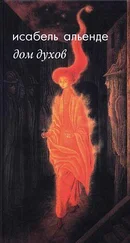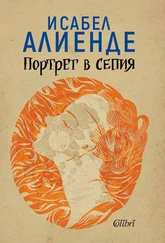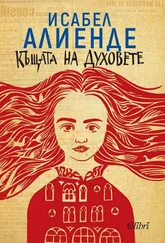“In fact, I was a medical auxiliary; I never had to fire a gun,” said Victor.
“A militiaman?” queried Ofelia, who had never heard that term before.
“That was what the Republican fighters were called before they joined the regular army,” Victor explained.
Felipe left them on their own, and Ofelia spent some time trying to get Victor to talk, but she was unable to discover anything they had in common, and received little encouragement from him. She asked about the bar, because Juana had mentioned it, and managed to drag out of him the fact that he wanted to complete the medical studies he had begun in Spain. In the end, irritated by the lengthy pauses, she left him.
Soon afterward, she caught him staring at her once more, and his boldness annoyed her, although she too was secretly observing him, fascinated by his ascetic face, aquiline nose, and prominent cheekbones, his veined hands with long fingers; his wiry, hard body. She would like to paint him, she thought, to do his portrait in black and white brushstrokes on a gray background, a full-length picture with him holding a rifle, and naked. The thought made her blush; she had never painted anyone naked, and had learned what little she knew of male anatomy in European museums, where most of the statues were mutilated or had parts covered by a fig leaf. Even the most daring were disappointing, like Michelangelo’s David, with his enormous hands and baby peepee. She had never seen Matias naked, but they had fondled each other enough for her to guess what was concealed beneath his trousers. She would have to see to judge. Why did the Spaniard have a limp? It could be a heroic war wound.
Victor was just as curious as Ofelia. He concluded they came from different planets, and that this young woman was of another species, unlike any woman he had met before. War distorts everything, including memory. Possibly in the past there had been girls like Ofelia: fresh, kept from the ugliness of the world, with spotless lives like blank pages where their destinies could be written in elegant handwriting without a single crossing-out, but he couldn’t remember anyone of the sort. Her beauty intimidated him: he was used to women prematurely marked by poverty or war. She seemed tall, because everything about her was vertical, from her long neck to her slender feet, but when she came over he realized she only reached his chin. Her thick hair was various shades of wood color, tied up with a black velvet ribbon; her mouth was constantly half-open, as if she had too many teeth, and was painted ruby red. Her most striking feature was her blue eyes, set far apart and with the distant expression of somebody staring out to sea from beneath arched brows. He decided it must be because she was slightly cross-eyed.
After dinner, the whole family, together with the children and servants, went in procession to Midnight Mass in the local church. The del Solars were surprised that the supposedly atheist Dalmaus accompanied them, and that Roser followed the rite in Latin, as the nuns had taught her. On the way, Felipe caught Ofelia by the arm and kept her back so that he could speak freely. “If I catch you flirting with Dalmau, I’ll tell Father, understood? We’ll see how he reacts to you setting your cap at a married man, an immigrant without a penny to his name.” She feigned surprise at his warning, as if the idea had never occurred to her. Felipe did not take Victor to task in the same way because he didn’t want to humiliate him, but decided to prevent him seeing his sister again at all costs. The attraction between the two of them was so overpowering that others must have noticed it as well.
He was right. Later on that night, when Victor went to say good night to Roser, who slept in the other bedroom with Marcel, she advised him not to fall into that temptation.
“That girl is out of your reach. Put her out of your mind, Victor. You’ll never be part of her social circle, let alone her family.”
“That’s the least of it. There are far greater obstacles than social class.”
“Yes, that’s true. Apart from being poor and morally suspect in the eyes of that inward-looking clan, you’re not exactly personable.”
“You’re forgetting the main thing: I have a wife and child.”
“We can get divorced.”
“In this country there is no divorce, and according to Felipe, there never will be.”
“You mean we’re trapped forever!” Roser exclaimed in horror.
“You could have put it more delicately. As long as we’re living here, we’ll be legally married, but when we return to Spain we’ll get divorced and that’s that.”
“That could be a long time away. Meanwhile, we’ve got to settle here. I want Marcel to grow up as a Chilean.”
“As a Chilean, if you wish, but our home will always be Catalan, and proud of it.”
“Franco has forbidden speaking Catalan,” she reminded him.
“For exactly that reason, Roser.”
CHAPTER 7
1940–1941
I have slept with you
the whole night long
while the dark earth turns
with the living and the dead.
—PABLO NERUDA
“Night on the Island”
THE CAPTAIN’S VERSES
VICTOR DALMAU ENROLLED AT THE university to complete his medical studies thanks to the fact that its president was a Vizcarra, and to the infallible system of social connections so common in Chile. Felipe del Solar introduced him to Salvador Allende, a co-founder of the Socialist Party, the president’s right-hand man, and the minister of health. Allende had followed with passionate interest the triumph of the Republic in Spain, the defeat of democracy, and Franco’s dictatorship, as though sensing an echo of his future. Allende listened to the brief account Victor Dalmau gave him about war and exile, and guessed the rest. It took him a single telephone call to get the School of Medicine to validate the courses Victor had taken in Spain and allow him to complete his studies in three years to obtain his professional diploma.
The courses were intensive. Victor knew as much as his professors about practice, but very little about theory: it was one thing to mend broken bones, and quite another to be able to identify them by name. He went to the minister’s office to thank him, with no idea how he could repay him. Allende asked if he knew how to play chess, and challenged Victor to a game on the board he kept in his office. The minister ended up losing good-humoredly. “If you want to repay me, come and play whenever I call you,” Allende told him by way of goodbye. Chess became the basis of the friendship between the two men.
Roser, Victor, and the boy lived with Felipe for several months, until they could afford to rent somewhere else. They refused any aid from the committee, because others needed it more. Felipe wanted them to stay on at his house, but they felt they had already been given more than enough, and it was time for them to stand on their own feet. The person worst affected by this change was Juana Nancucheo, because now she had to catch a tram to see Marcel.
The friendship between Victor and Felipe continued, although it was hard to maintain as they belonged to different circles and were both extremely busy. Realizing how much he had to offer, Felipe tried to get Victor to join the Club of the Enraged, whose meetings were gradually losing their intellectual tone and becoming increasingly frivolous, but it was plain Victor had nothing in common with those friends of Felipe’s. On the only occasion Victor attended the group, he gave monosyllabic answers to the bombardment of questions about his hazardous life and the war in Spain. The members of the club quickly grew tired of getting only crumbs of information out of him, and proceeded to ignore him. In order to avoid him encountering Ofelia again, Felipe also didn’t take him to his parents’ house.
Читать дальше











